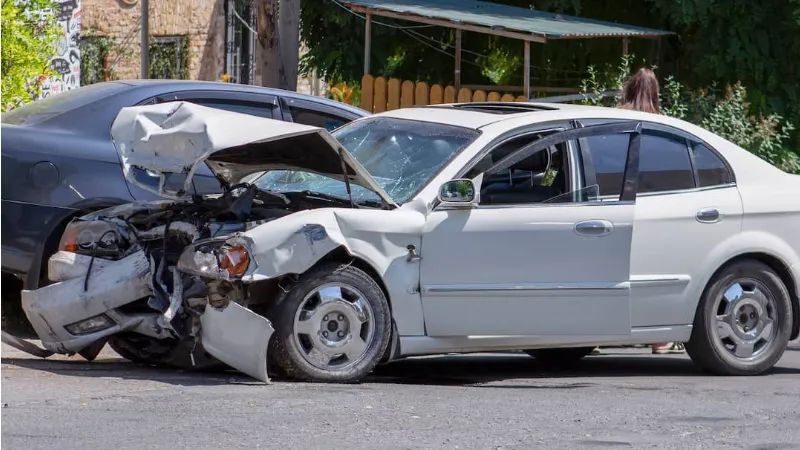Does Health Insurance Cover Car Accident Injuries? See the Answer
Yes, health insurance covers car accident injuries; however, it is typically the secondary form of insurance coverage after a car crash. In most states, including Kentucky, auto insurance coverage pays for medical care for accident injuries up until the available policy limits are reached.
Table of Contents
When Does Health Insurance Pay for Auto Accident Injuries?
When you’re hurt in a car accident, health insurance is frequently used as secondary protection. Only after all other forms of insurance have been used up will it pay for medical care. Either your own auto insurance policy or the driver who caused the collision has primary insurance coverage, also known as first applied coverage.
All states, with the exception of Virginia and New Hampshire, require drivers to have auto insurance, which will pay for auto accident injuries first, up to the policy limits. Your health insurance policy will take over to pay for the balance of your medical costs once your medical bills exceed the auto insurance coverage limits.
Since Kentucky is a choice no-fault state, all drivers are automatically required to have Personal Injury Protection (PIP) coverage on their auto insurance policy. PIP insurance serves as the primary form of protection for the majority of accident victims in Kentucky, prior to applying for health insurance. States like Maine require drivers to carry similar medical payments coverage (MedPay), which is considered primary coverage and will pay for accident injuries before health insurance.
Drivers in states like New Jersey have the choice to make their health insurance policy their primary source of compensation for injuries sustained in auto accidents. In these states, health insurance takes priority over PIP coverage, and PIP coverage only kicks in if your medical costs go over your health plan’s allotment. In Michigan, drivers can combine their health and auto insurance plans so that their health insurance covers medical expenses and PIP coverage covers lost wages.

Understand What Your Insurance Plan Covers
Most states require auto insurance before allowing you to register a car. Understanding auto insurance coverage requirements and how your applicable auto insurance coverage can cover your accident injuries, though, can be challenging. The two main insurance provisions to consider in Kentucky are personal injury protection (PIP) and auto liability coverage (PD/BI).
- If you cause harm to another driver’s vehicle or property as a result of an accident, property damage liability coverage is applicable. $10,000 per accident is the required minimum in Kentucky.
- If you cause bodily harm to another driver as a result of an accident, you are legally responsible for it. Kentucky requires a minimum of $25,000 per person and $50,000 per accident in insurance.
- Whoever was at fault for the accident does not matter; personal injury protection still applies. In Kentucky, a $10,000 per accident minimum is required.
PIP coverage will cover up to $10,000 in medical costs for each person and up to 85% of lost wages, up to a maximum of $200 per week. While this is useful in the aftermath of a collision, if you have sustained serious injuries in an auto accident, $10,000 will not get you very far. Despite the fact that the state does not require any particular coverages, this is where the specifics of your health insurance policy come into play.
Types of medical coverages applicable under your health insurance policy may include:
- Hospitalization
- Prescription drugs
- Rehabilitative services and devices
- Laboratory services (diagnostic tests)
- Emergency services (ambulance services)
- Ambulatory medical services (outpatient care)
- Mental health (counseling and psychotherapy)
Does Health Insurance Pay for Car Accident Injuries?
Your health insurance may cover your injuries from a car accident depending on your policy. In order to prevent your premiums from rising after the car accident settlement, you can pay them back.
Regular Health Insurance
In Georgia, injuries from auto accidents are typically covered by health insurance. It will have the same limitations for a car accident injury as it will for any other health issue you might experience. Since they don’t want their premiums to go up, many people are concerned about using their health insurance after an accident that wasn’t their fault.
However, health insurance is available and should be used, particularly when you are unable to pay for your medical expenses.
Health insurance companies occasionally decline to cover the cost of medical treatment for injuries sustained in auto accidents. The goal of this strategy is to intimidate claimants into settling their lawsuits. It is against the law for your health insurance company to refuse to pay for necessary care. If you experience this, speak with a personal injury lawyer right away.
Med Pay
Medical payments coverage (“med pay”) is a type of coverage in a car insurance policy. Only if you choose to pay an additional premium for it will you have this optional coverage, as it is an option. Your hospital, physician, and ambulance expenses may be covered by the med pay, typically up to a predetermined amount. Frequently, the cap is $5,000 to $10,000. To find out what your med pay limit is, you will need to consult your specific policy.
Use your medical pay sparingly if you have health insurance because once you use it, it’s gone. Copays, deductibles, and other expenses that your health insurance doesn’t cover are best paid for with med pay. For the remainder, use health insurance. This will extend the life of your money and lessen liquidity problems following an accident.
Does Car Insurance Or Health Insurance Pay for Injuries First?
Auto accident injuries are covered first by car insurance. Whether the accident occurred in an at-fault or no-fault state determines which car insurance policy pays out first—the accident victim’s or the at-fault driver’s. Injury care is initially covered by the at-fault driver’s insurance policy in states where there is comparative negligence, such as Georgia or Colorado. No matter which driver was at fault, medical expenses in no-fault states like Florida and Kentucky are first covered by the victim’s PIP or MedPay insurance.
Your auto insurance provider will send you a PIP or MedPay application if you were hurt in a car accident in a no-fault state. Until your coverage limits (usually $10,000) are reached, this process will automatically direct payment to your medical providers. Your medical bills are sent to your secondary provider, who is likely your health insurance provider, after these coverages have been used up.
Your health insurance provider can send the remainder of your medical bills to the at-fault driver’s auto insurance company for reimbursement. You will be responsible for your usual deductible and copay during treatment. Similar to this, you might be able to file a personal injury claim to get paid for the medical bills that the providers can recoup by filing a medical lien.
Should You Get PIP Or MedPay If You Have Health Insurance?
While health insurance, PIP, and MedPay all assist you in covering post-auto accident medical costs, they each have a different function. Even if you’re not required to by state law, you might want to think about including PIP or MedPay in your auto insurance coverages.
One example is that PIP and MedPay can also assist in covering your health insurance deductible. The remaining MedPay allotment can be used to cover your health insurance deductible if you expect to need it, such as if your PIP or MedPay allowances run out. Funeral costs will also be covered by PIP and MedPay, which health insurance does not. Funerals are expensive, which, while unpleasant to think about, can cause your family more financial stress in an already difficult situation. They will be paid for by PIP and MedPay.
For passengers hurt while riding in your car, PIP and MedPay also offer coverage. It might be advantageous to have PIP or MedPay cover their injuries in the event of an accident if you frequently travel with non-immediate family members.
Next, PIP, but not Losses from injuries are typically covered by MedPay. You might not be able to work, for instance, if you break your leg in a car accident and you work in construction. Depending on your policy, PIP will compensate you for the wages you would have otherwise earned up to a certain amount. For example, standard PIP coverage in New York State offers 80% of your earnings, up to $2,000 per month, with a maximum payout of $50,000. This clause is not present in health insurance policies. It’s important to remember, though, that if you have disability insurance, both short- and long-term, it would cover you in this circumstance.
The knowledge that you have a second source of coverage to pay for a potentially expensive injury simply brings about a certain amount of peace of mind. After a car accident, medical expenses can mount, so having PIP or MedPay coverage worth an additional $50,000 can be helpful. Additionally, you’ll be prepared should your health insurance provider reject your claim.
Read about

